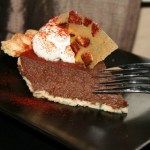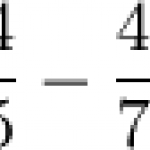Mathematics
Dr. Isis has some rollicking good discussions going on at her pad about who might care about blogs, and what role they might play in scientific education, training, and interactions. (Part one, part two.)
On the second of these posts, a comment from Pascale lodged itself in my brain:
I think a lot of impressionable girls, especially in that middle-school age group, get the idea that they can't be good at science or math if they like clothes, makeup, and boys. Is it the science/math sterotype that is the problem, or is it that girls make other choices to pursue these alternate interests? "I…
A while ago, I talked about some things biologists should learn, and the glaring omission was mathematical fluency. I bring this up because one of the things the Mad Biologist does is work on the Human Microbiome Project (between that, and fighting evil, we are very busy...). The part of the Human Microbiome Project ('HMP') that I'm involved with is a consortium of four sequencing centers and an informatics center, whose goal is to sequence the microbes associated with 18 different body sites from 250 people. And math is vital to what we do.
Before I get to the reason why math matters,…
Over 9 months ago I decided to apply for teaching tenure track jobs. Then the economy took what can best be described as a massive, ill-aimed, swan dive. Thus creating an incredible amount of stress in my life. So what does a CS/physics research professor do when he's stress? The answer to that question is available on the iTunes app store today: arXiview. What better way to take out stress and at the same time learn objective C and write an iPhone app that at least one person (yourself) will use?
What is arXiview? It is yet another arXiv viewer (there are two others available, last I…
Regular blogging will not resume until the end of the semester, but I couldn't resist emerging from my hidey hole to call attention to this article, from The Times of India:
Bad at maths? Gorge on chocolates before you attempt your next
examination.
A new study has revealed that eating chocolate could improve the brain's ability to do maths as well as boost your energy level.
Researchers have carried out the study and found that flavanols, compounds found in chocolate and part of a group of chemicals called polyphenols, actually work by increasing the flow of blood into the brain.
According…
Since we're trying to get out of town for the weekend, Casa Free-Ride is a hive of activity. (As we seem to be passing another cold back and forth, it's also a hive of mucus. Ew.) But we have time to update you on recurrent topics of conversation this week around the Free-Ride kitchen table.
This week, it's been all about math.
The younger Free-Ride offspring has been finding the math in the second grade classroom a little ... boring. They're doing multi-digit addition and subtraction, and while "carrying is OK, borrowing is boring!" I wonder whether this is an issue that could be…
It's a proud day for any parent when offspring start getting interested in formal proofs. So I felt a little thrill when the elder Free-Ride offspring sat down with Dr. Free-Ride's better half to consider whether it was possible for there to be a largest prime number:
:
Not just a proof, people. A proof by reductio!
It makes a mother a little emotional.
Lest I get totally verklempt, let us note the levity my child has inserted into the proof.
In the line of the proof that notes the contradiction (that n, which is prime and also greater than p presents a problem for the claim that p is the…
Vote for Mrs. Pontiff's entry into the Scienceblogs pie contest here
"Bacon made me do it."
3.141592...om nom nom nom! Behold! Mrs. Pontiff's entry into the Scienceblogs pi day pie contest, variously known as "Spicy Brittle Bacon Chocolate Pie", "Spicy Pi Bacon Squared", or "Bacon brittle...om nom nom nom nom!"
(On the March 14, a poll will open on scienceblogs for the pi contest. Then all two of the readers of the Quantum Pontiff (hi mom!) can then vote for Bacon Bacon Bacon Pi Pi Pie Pie!)
Pi is a miraculous number. Who would have thought that the ratio of the circumference of a circle to it's diameter was always the same? Or that you could express this number with some 4's…
From a crazy model to a concrete question: is there a nice mathematical structure hidden here?
Once upon a time I wrote a crazy paper (arXiv:quant-ph/03091189) on quantum computation in the presence of closed time-like curves. In this model, one identifies two types of quantum systems: those that are "chronology respecting" and those that traverse "closed time-like curves." These two types of quantum systems can interact amongst themselves and also between each other. A typical setup is as in the figure at the right, where n chronology respecting qubits interact with l closed time-like qubits…
This particular problem is a bit too applied for my taste, but it's always nice to see mathematicians in the news:
For decades, math and computer science have played a profound role in the drawing of legislative districts. And it's hard to argue that they've improved the process. As the amount of information and computing power available to the gerrymanderers has ballooned, they have gotten much better at surgically crafting districts to their precise desires.
So, with a reapportionment of House seats coming up in just over two years, after the next decennial census, mathematicians are now…
Since I am still getting caught up on my blog reading after my trip to the big conference, I have only just noticed Jeffrey Shallit's interesting post on information theory. He writes:
Creationists think information theory poses a serious challenge to modern evolutionary biology -- but that only goes to show that creationists are as ignorant of information theory as they are of biology.
Whenever a creationist brings up this argument, insist that they answer the following five questions. All five questions are based on the Kolmogorov interpretation of information theory. I like this version…
Now that the big ScienceBlogs software upgrade is complete, I can tell you about the big conference in Washington D.C. Lucky you!
According to careercast.com, mathematicians have the most wonderful job there is. I am inclined to agree, of course. I don't understand why everyone doesn't get a PhD in the subject and join the fun.
This is the annual Joint Mathematics Meetings, so called because it is organized jointly by the American Mathematical Society and the Mathematical Association of America (no Monty Python jokes, please.) It is basically a big math party. Feeling glum about the…
In a frequently recycled list of proposed New Year's resolutions, Ann Landers urges:
Vow not to make a promise you don't think you can keep.
However, she fails to advise a course of action in the case that you think you might not be able to live up to this vow.
(Maybe she was too busy trying to construct a set containing sets that are not members of themselves.)
I wonder how many people this week realized that "ten percent down" followed by "ten percent up" does not equal "no change." Probably a few. And how many realized that "ten percent down" followed by "ten percent up" is the same as "ten percent up" followed by "ten percent down"? Or that up 5 percent, down 3 percent, up 2 percent, down 8 percent, and down 8 percent in that order is the same as down 8 percent, up 2 percent, down 3 percent, up 5 percent, down 8 percent in that order? Commutativity is cool. Yes, I am easily amused.
DonorChoose, an organization which matches teachers requests for funds with donors, is running their annual blogger challenge. Already Cosmic Variance is trying to harness their vast resources of physicists, The Optimizer is appealing to the base nerd in everyone, He of Uncertain Principles is offering up his dog's services for donations (does the dog know?), and the moral Mathematician is offering solutions to math homework problems (err I mean blog posts on a chosen topic.) But I think you shouldn't fall in this trap and support those blogs....
Because, of course instead you should…
DARPA math challenges. My favorite is "Mathematical Challenge Nineteen: Settle the Riemann Hypothesis." I'm guess that's one where you can't follow the age old strategy of writing a grant proposal for work you've already figured out ;)
Two new Mersenne primes: 243,112,609-1 and 237,156,667-1. The former is now the largest prime number known. Interestingly the larger was discovered before the former, thus winning $100,000 from the EFF for Edson Smith who installed the software which identified this Mersenne prime on a UCLA computer. The $100K prize was for the first 10 million digit prime. The next prize is $150K for a 100 million digit prime number. Pretty amazing that two 10 million digit Mersenne's were discovered within weeks of each other.
Mersenne primes are prime numbers which are a power of two minus one, i.e. of…
There's a neat article [1] in the September-October 2008 issue of American Scientist (although sadly, this particular article seems not to be online) in which Brian Hayes discusses the Monty Hall problem and people's strong resistance to the official solution to it.
Now, folks like Jason have discussed the actual puzzle about probabilities in great detail (on numerous occasions). It's a cool problem, I believe the official solution, and I'm not personally inclined to raise skeptical doubts about it. What I really like about Hayes's article is how he connects it to the larger ongoing…
When I was a little kid I used to take a pair of dice and throw these dice repeatedly. At each throw I'd fill in a box for the corresponding number on some graph paper and I would essentially "race" the numbers against each other. I suppose for that reason I've always been fascinated not just by probabilities, but in the convergence of repeated trials to the limiting "probabilities." Which explains not just why I'm an uber geekazoid, but also why I was quite shocked today when I Googled "gambler's ruin" and found that the intertubes only returned about 16000 hits ("card counting," by the…

